|
|
|
Sort Order |
|
|
|
Items / Page
|
|
|
|
|
|
|
| Srl | Item |
| 1 |
ID:
140451


|
|
|
|
|
| Summary/Abstract |
Tajikistan experienced a brutal civil war shortly after independence, in which an estimated 50,000 people died. Yet the scope, patterns and effects of civilian victimization in Tajikistan remain under-examined. This article explores two key questions: (1) What types of civilian victimization were utilized by the war's victor, the Popular Front of Tajikistan (PFT)? (2) What were the strategic effects and outcomes of civilian victimization by the PFT? The aim is to disaggregate civil war violence in Tajikistan and enable new avenues of research into its patterns and effects. The article's key findings are that civilians were victimized primarily through targeted violence and displacement, and that victimization was generally a successful strategy for the PFT.
|
|
|
|
|
|
|
|
|
|
|
|
|
|
|
|
| 2 |
ID:
140449
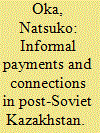

|
|
|
|
|
| Summary/Abstract |
In Soviet times, useful contacts had more value than money, and getting things done through unofficial channels of personal relations was a socially accepted norm. What changes have market reforms brought to Kazakhstan in these areas? This article details the use of informal payments and connections in Almaty and examines why non-monetary exchange of favours is increasingly being replaced by the immediate exchange of cash for assistance. This article argues that urban residents are becoming more inclined to quickly return a favour through cash and evade the lengthy exchanges involved in building reciprocal relationships, a practice widely accepted during Soviet times. This article also focuses on the importance of personal contacts in monetized exchange and demonstrates that cash payment is not a least preferred strategy for those who lack necessary networks. Urban residents in Kazakhstan in fact actively mobilize their personal networks to effectively and securely exchange monetary rewards.
|
|
|
|
|
|
|
|
|
|
|
|
|
|
|
|
| 3 |
ID:
140450
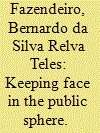

|
|
|
|
|
| Summary/Abstract |
The manner in which President Karimov's roles were recognized in the global arena affected how Uzbekistan's international relations developed – a perspective that highlights both the form and the content of bilateral relationships. While mutual interests are crucial to beginning a relationship, it is also important to understand how those relations were recognized in public and dealt with in private. If partners managed to recognize Karimov's agenda publicly, or at least act with discretion, this tended to create an atmosphere favouring cooperation. As such, recognition and discretion reveal much about Karimov's concerns with international equality and self-reliance, pointing to the reasons why Uzbekistan's relations fluctuated more with some actors than others. The United States and Germany are ideal examples of that ambivalent situation: Washington often cooperated with Uzbekistan on security matters, but then saw its military personnel excluded from Qarshi-Qanabad after the 2005 Andijan crisis; whereas Berlin witnessed little change in its relationship with Uzbekistan and continued to lease a base in Termez after 2005. This difference in outcomes can be explained in part by a dynamic of recognition and discretion.
|
|
|
|
|
|
|
|
|
|
|
|
|
|
|
|
| 4 |
ID:
140452


|
|
|
|
|
| Summary/Abstract |
Individuals in and around protests are generally classified as either participants or nonparticipants. However, observers witnessing protests can also play an important role in collective actions by sharing their experiences. This paper explores the characteristics of observers during the 7 April 2010 demonstrations in Bishkek, Kyrgyzstan. Based on data collected via a survey of university students, I demonstrate that protest observers differed from nonparticipants on a range of variables. A key factor differentiating student observers from nonparticipants was their online activity prior to the protests. Logistic regressions show that students with higher rates of online activity were significantly and substantially more likely to be protest observers than nonparticipants. These findings provide empirical evidence for categorizing observation as a distinct level of protest involvement, shed light on the demonstration in Bishkek on 7 April 2010, and suggest that examining online activity can contribute to a better understanding of protest involvement levels.
|
|
|
|
|
|
|
|
|
|
|
|
|
|
|
|
| 5 |
ID:
140447
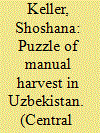

|
|
|
|
|
| Summary/Abstract |
Uzbekistan has attracted international criticism for its use of child labour, defined as labour performed by youth under the Soviet legal limit of 16, to harvest cotton by hand. This article argues that manual labour, mostly performed by low-status children and women, became entrenched in Central Asian agriculture during the 1950s, and investigates the possible reasons for its persistence in the face of global trends to the contrary. The timing is a puzzle, because the 1950s were when mechanization of agriculture became a global development goal. The USSR participated in the mechanization trend. To understand better the roots of rural labour patterns in the Khrushchev period, we must consider how economic incentives and disincentives, gender relations, demographics, and state policy worked together.
|
|
|
|
|
|
|
|
|
|
|
|
|
|
|
|
| 6 |
ID:
140446
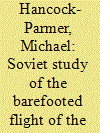

|
|
|
|
|
| Summary/Abstract |
The defeat, devastation and exile of the Kazakhs in the early eighteenth century, commonly known as the Barefooted Flight, was the nation's most distressing pre-Soviet calamity. Kazakh nation-building and official remembrance projects – commemorated in state ceremonies, public education and popular culture – portray an uninterrupted, centuries-old practice of tribute to local heroes who challenged the foreign aggressors. Twentieth-century Kazakh and Russian intellectuals in the Soviet and post-Soviet eras studied and enshrined these events based on published, secondary sources, rarely giving attention to the thin trail of documents preserved in state archives. The historiography of the Barefooted Flight exposed a trend in how politically convenient historical lessons shaped the interpretation of events. By the end of the Soviet Union, some archival material was introduced, it was but misquoted so as not to challenge the current interpretation.
|
|
|
|
|
|
|
|
|
|
|
|
|
|
|
|
| 7 |
ID:
140448
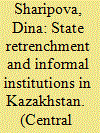

|
|
|
|
|
| Summary/Abstract |
Despite government efforts, post-independence Kazakhstan has largely failed to provide high-quality medical services to its population. State retrenchment in the public healthcare system has led to the deterioration of medical service delivery. It has provided incentives for people to widely use informal reciprocal exchanges – personal connections and informal monetary and non-monetary payments – to gain access to better medical care. In contrast to the existing explanations focusing mostly on the cultural origin of the continuity of informal exchanges, I argue that state retrenchment from the social sphere and under-provision of state goods and services have perpetuated informal exchanges in post-Soviet Kazakhstan. Despite similarities in informal practices between Soviet and post-independence Kazakhstan, some important differences in terms of scope and the nature of informal exchanges are observed. This article draws on data collected from interviews, textual analysis, and original surveys of people's attitudes towards the healthcare system and informal help conducted in Kazakhstan in 2011 and 2013.
|
|
|
|
|
|
|
|
|
|
|
|
|
|
|
|
|
|
|
|
|